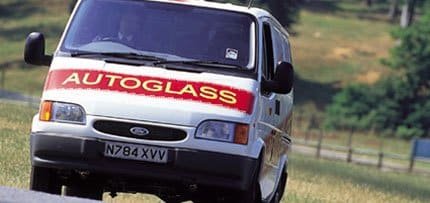
Anyone who has experienced a broken windscreen will know the sickening feeling of frustration and helplessness this can cause. Autoglass’ central philosophy is making life easier for the motorist.
Autoglass, as we know it today, has its origins in two separate companies. In 1969, Tony Bates started a small family business in Bedford called Windshields, which became well-known for its pioneering approach. In those days windscreens were made of toughened glass, which would smash if hit with sufficient force and the pieces of glass would end up inside the car.
Autoglass was formed in 1974 and, by 1983, had over 40 branches and 100 mobile fitting units. In 1984, the two firms merged to become initially Autoglass Windshields and a year later the second part of the name was dropped – the name Autoglass remains to this day. The company presently has 180 branches and 900 mobile fitting units.
This case study examines the way Autoglass developed strategies and day-to-day tactics in order to evaluate and monitor progress while advancing its established corporate objectives.
The Autoglass vision
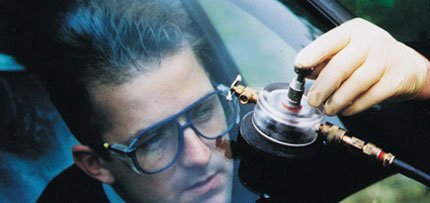
The merger in 1984 brought together two very different firms, one a family business and the other much more process orientated. Nevertheless, the two complemented each other and this enabled the development of a ‘people first’ culture. Above all, Autoglass wanted to change from simply a garage service company into a customer service company.
On average, a motorist will need to replace a windscreen every ten years. It is a rare occurrence, but nonetheless stressful. Autoglass recognises that a new windscreen is a ‘grudge purchase’ and that most of its customers truly wish they did not have to call. With new laminated windscreens and the ability to repair minor damage, the need to replace the whole windscreen has become even less common, but unfortunately, there has also been a rise in smash and grab car crime. This can serve only to heighten the consumer’s frustration and anxiety.
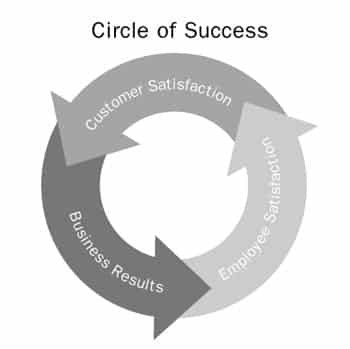
Autoglass has had at the core of its business, the objective of becoming and being recognised as a world class service provider. As such, Autoglass wants its customers to regard the company as among the best of all the service providers they encounter. This strategy has been developed into the circle of success.
The idea is that employee satisfaction can be achieved through a highly motivated, enthusiastic, well-developed and valued workforce. This will lead directly to greater customer satisfaction. If customers are impressed with the service they receive, they are more likely to use Autoglass in the future, should the need arise. Repeat purchases lead to better business results and greater potential rewards that will, in turn, reflect improved employee satisfaction.
Delivering the vision
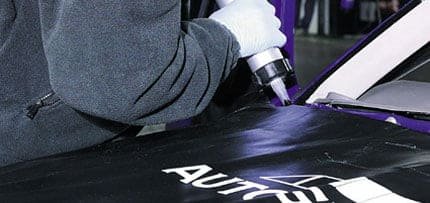
In addition to all elements of the circle of success being measurable, Autoglass has pioneered a number of initiatives to deliver this vision. Autoglass was:-
- the first to train fitters to the highest NVQ standards – 80 per cent of all Automotive Glazing NVQs awarded have been earned by Autoglass employees
- the first to specialise in vacuum filling windscreen repairs, which is 70% cheaper than full windscreen replacement. In 1999, Autoglass will save its customers over £12 million due to this commitment to repair rather than replace a windscreen whenever possible
- the first to offer motorists glass repair and replacement via the Internet.
Autoglass is the only company in the market to:-
- offer 24-hour emergency roadside assistance, guaranteed to reach motorists anywhere on the UK mainland and in Northern Ireland within 90 minutes
- supply 95 per cent of windscreens and body glass from stock first time. Autoglass recently increased its stock holding by £2 million to reduce the possibility of being out of stock
- operate throughout Europe with around 500 branches
- be recommended and used by both the AA and RAC.
Autoglass now has the most sophisticated call handling facility in the industry, with 24-hour cover. All operators receive comprehensive training in customer service. It has a nationwide IT stock control system, monitoring the stock in ‘real time’.
Customer satisfaction

Customer satisfaction has always been the company’s priority and every possible technological innovation has been adopted to make life easier for its customers. Autoglass was one of the first companies in the UK to introduce a centralised call centre. This provides an initial point of contact for a rapidly growing number of customers over an increasingly wider geographical area.
The first Autoglass call centre was set up in a Portakabin, which had previously been used by a coffin maker, with four seats and a very basic telephone system. To keep pace with the growing market and increasing consumer expectations, this facility has expanded and relocated until it has arrived at the present call centre in Autoglass’ uniquely designed glass dominated new head office. Here 159 Customer Advisers operate 24 hours a day, 365 days a year and handle 1.6 million calls per year. They also now receive calls from the Autoglass website www.autoglass.co.uk – providing a further interactive way that customers can contact the company.
Autoglass was only the second company in the UK to use an easily remembered free 0800 number. The latest system allows the Call Centre to put the motorist in direct contact with a local branch with a ‘one call does it all’ service. Equipped with Computer and Telephony Integrated Technology (CTI), the operators have access to all the most recent technical data and up to date information necessary to respond to each call swiftly and efficiently. CTI makes it easier to handle every situation correctly without prior expert knowledge and complex technical training, enabling Autoglass to select its call centre operators on the strength of their inter-personal or ‘people-orientated’ skills. This ensures customers are always greeted and dealt with in a friendly and competent way, meeting their highest expectations.
Autoglass has undertaken a number of activities that promote customer satisfaction. It has played a leading role in driver and passenger safety, in particular in the development of Quicklink. Quicklink is a new quick-drying adhesive that enables the windscreen to be bonded straight onto the bodywork of the car. This significantly adds to the strength and rigidity of the car and will absorb much of the energy in a collision. The windscreen also provides the only means of support for airbags. Without the windscreen, they become virtually useless. Quicklink allows the driver to be back on the road sooner and safer.
Acknowledging that a high proportion of glass damage is linked to car crime, Autoglass has joined forces with Toad, a market leader in security and audio re-installation. This provides a one-stop-shop for the customer. Combining computer, telecommunications, and customer handling systems creates significant economies of scale for the firms and greater convenience for the customers.
Fleet servicing
An important part of Autoglass’ business is Fleet Servicing, where getting a car or lorry back on the road might be critical. Fleet managers have specific needs and Autoglass has become more proactive – contacting customers to discuss their requirements rather than waiting for them to call with a problem.
Autoglass representatives visit these customers on a regular basis to inspect their fleet of vehicles to identify any potential glass related problems. This reduces glass replacement costs and the fleet’s vehicles spend less time off the road.
Training and development
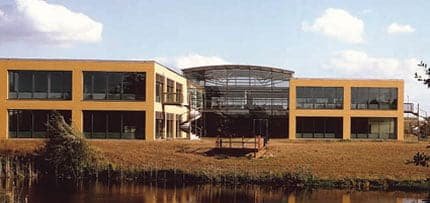
One of the most important issues is the training and development of human resources across the company. Autoglass recognises the importance of investing in a highly skilled, effective workforce. Training has also been recognised by many theorists as one of the most important ways of motivating a firm’s employees. The Autoglass training strategy has centred on tailored initiatives aimed at identified core competencies. The company has tried to identify the particular skills that are essential to achieving the aim of the business – to become a world class service provider.
Training focuses on skills and ensures that all employees, from senior managers to new recruits at the branch level, are fully conversant with the aims of the business. Each course is specifically designed for the individual’s requirements. For example, new employees undergo a ‘Startline’ programme, an induction course that contains both technical training for their particular job and common elements to ensure everyone understands the business, how it works and who the customers are.
Time is spent in each of the areas of the company – at a branch, at the call centre and in various departments at Head Office so that all employees have a basic understanding of the role of others within the business. This not only enables them to perform their own roles better but makes them aware of the impact they may be having on others and why certain things are done in the way they are.
Startline is only the first step and Autoglass has tried to develop a culture of training throughout the company. For the fitters, the skills development programme lasts up to eighteen months and leads to an NVQ. They are constantly kept up-to-date with all the latest technical developments, such as the launch of Quicklink bonding.
At the Call Centre, operators’ performance is monitored and recording calls enables the team leaders to identify areas specific to individuals that can be improved. Senior managers across the business have to continue their training in all the necessary management skills; some take an MBA course with Loughborough University.
Autoglass is totally committed to the future development of people skills within the company. This emphasis on training has already produced positive benefits; there has been a fall in labour turnover and a greater level of internal appointment to more senior roles as individuals have acquired the necessary skills and competencies.
As all employees have a wider understanding of the way the business operates, more innovative ideas and developments are possible and this opens up new areas of business.
Conclusion
Autoglass has conducted a detailed telephone survey of 20,000 customers to identify what drivers actually want, rather than what Autoglass believes customers want. The results showed that customers wanted a choice between a mobile service and visiting a branch.
Independent research shows that Autoglass customers are significantly happier than those who use the competition and an enormous 92% of customers found the service as good as or better than services provided in other sectors, such as retailing or banking. It has consistently won awards for being the Best Windscreen Replacement Company amongst fleet customers.
The focus on customer service has resulted in Autoglass becoming a pioneer in its field. With the current service ethic – a commitment to ‘Hassle Elimination’ – now firmly in place, taking the firm beyond its original vision, Autoglass is in a strong position to face the new millennium. However, this will need to be constantly challenged, evaluated and developed in the future.
